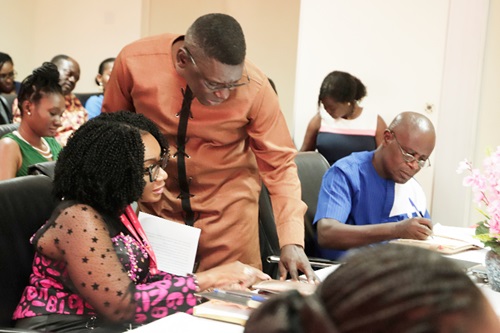
Blood collection records huge deficit - Blood Service
The National Blood Service (NBS) collected 182,696 units of blood last year, a volume which fell far below the annual demand of over 300,000 units recommended by the World Health Organisation (WHO), a 2023 performance review report of the service has indicated.
Advertisement
The situation means the country has a huge deficit of 117,304 units of blood to collect annually to save the national blood bank from any shortage.
However, the report revealed that the 182,696 units, representing 99.7 per cent of its annual target, was five per cent more than the 2022 performance of 169,435 units.
Out of the total, only 30 per cent constituted voluntary and unpaid donations, while the remainder was made up of family replacements, a situation the service described as worrying and a threat to the availability of safe blood to boost healthcare delivery.
The Annual Performance Review held in Accra last Wednesday was on the theme: “Give blood, give plasma, share life, share often”.
It brought together all stakeholders in the blood collection and preparation space along the value chain to take stock of the national blood collection performance, review challenges and deliberate on how to innovate to meet national demands in the short term.
The stakeholders included the Ghana Health Service, teaching hospitals, Food and Drugs Authority and representatives from the private sector partners.
Presenting the report, the Chief Executive Officer (CEO) of the NBS, Dr Shirley Owusu-Ofori, attributed the improvement to intensification of public education, acquisition of more hands, the institution of the first-ever Board of Directors, and the reorientation of staff.
She reiterated her call on partners and stakeholders to commit themselves to the greater goal of 100 per cent voluntary unpaid blood donation.
She also appealed to the public to avail themselves to donate blood regularly to ensure that safe blood products were available to those who needed it all the time such as accident victims, women being delivered of their babies, people on dialysis, among a wide range of people who need blood on a daily basis.
Dr Owusu-Ofori said ensuring that the country had enough blood stock at its blood bank to facilitate quick and easy access was a shared responsibility and, therefore, called on the citizenry - 17 years and above and screened to be eligible - to make blood donation a lifestyle.
She said the blood that was donated would save a live and that life could be yours or that of a family member or a friend.
Challenges and outlook
Dr Owusu-Ofori said regardless of the successes, the service was challenged in various ways, including inadequate government budget for goods and services; inadequate specialised logistics - vehicles and essential logistics at the zonal blood centres - and improper coordination of blood services nationwide.
The rest are inadequate numbers and proportion of voluntary blood donors, leading to over-reliance on family replacement; inadequate funding for logistics for the recruitment of voluntary blood donors, and high attrition rate, among others.
Highlighting their outlook for the year, she said the NBS was looking forward to opening regional blood banks to coordinate blood collection and distribution in all 16 regions for easy access.
“We will also develop and implement a national public education and sensitisation enhancement programme on voluntary blood donation, develop a policy on blood donor incentives and develop a national strategy to convert family replacement donors to voluntary regular donors, among many other innovations we have tabled for this year,” she said.
MoH
The Director for External Health Cooperation, Ministry of Health (MoH), Dr Hafez Adam Taher, said the importance of blood in saving the lives of people in emergency situations could not be over-emphasised.
“To this end, I commend the country’s voluntary blood donors who have shown their selfless commitment in making sure safe and adequate blood and blood products are made available in our hospital blood banks.
“It’s important to note, however, that the country’s blood supplies still fall short of the units required annually, particularly because people want to wait until a family member needed it.
“But it has to be emphasised that family replacement system does not ensure timely availability of safe and adequate blood, especially in emergencies.
We or our family members cannot wait for us to come and give blood before we are saved during an emergency; it might be too late,” he said.
Writer’s email: [email protected]




